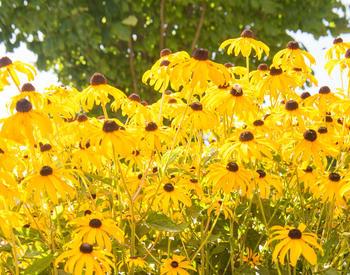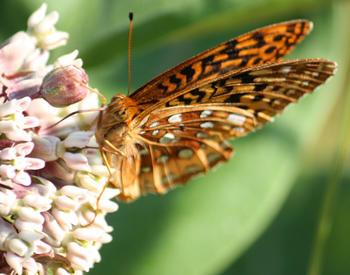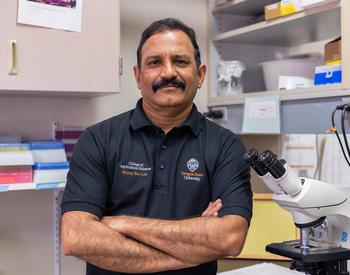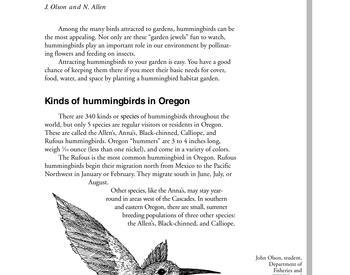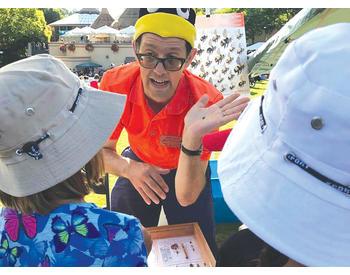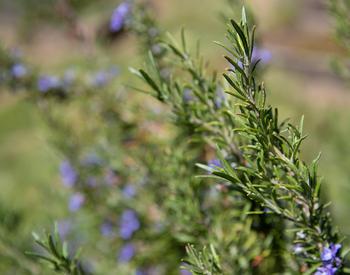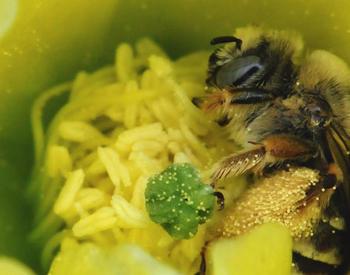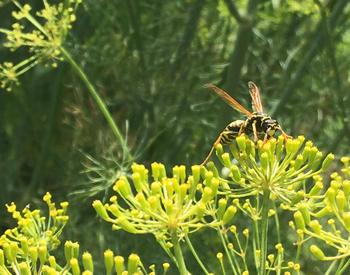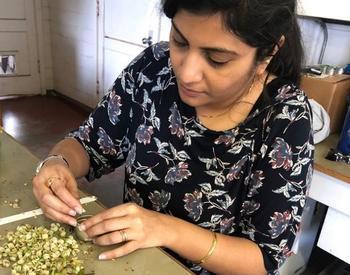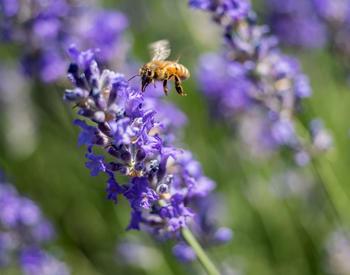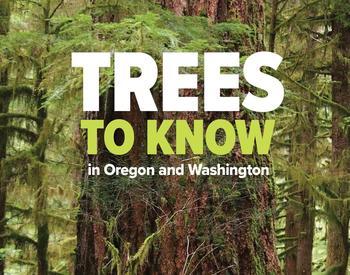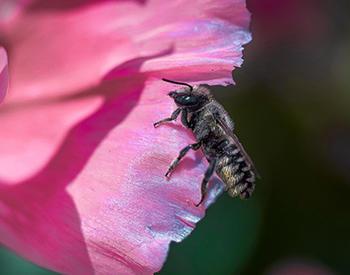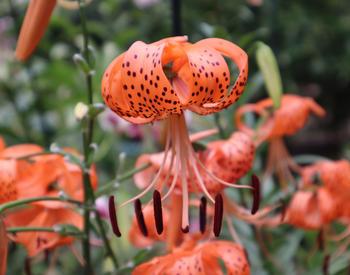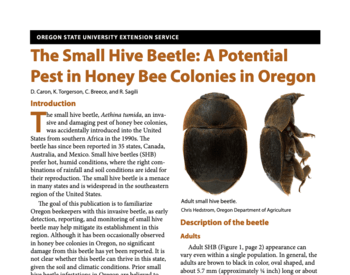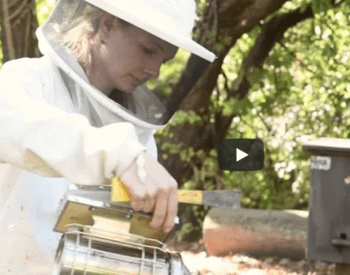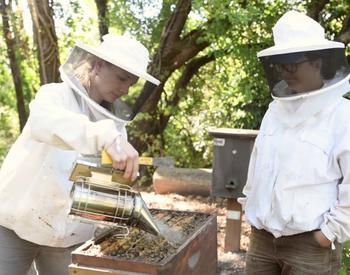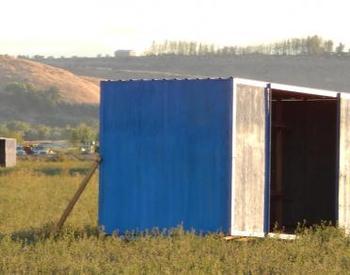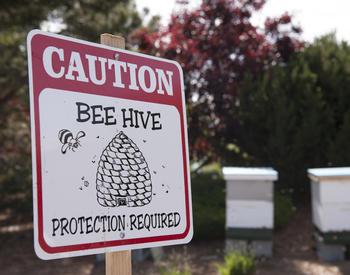Transcript
Speaker 1: From the Oregon State University Extension Service, this is Pollination, a podcast that tells the stories of researchers, land managers, and concerned citizens making bold strides to improve the health of pollinators. I'm your host, Dr. Adoni Melopoulos, assistant professor in pollinator health in the Department of Horticulture. Today on Pollination, we're talking about mosquito abatement and pollinator health.
Now, arguably, mosquito abatement is one of the great achievements of modern public health. However there are concerns today about the potential of mosquito adulticides, and these are insecticides applied to kill the adult mosquitoes to pollinators. To get a better idea of the potential risks of mosquito control to pollinators, we contacted Dr. Kirsten Healy, who's an assistant professor in the Department of Entomology at Louisiana State University.
Now, a key focus of Dr. Healy's research at LSU has been collaborating with the U.S. Department of Agriculture's Honey Bee Lab in Baton Rouge to evaluate how different stressors impact honey bee health. This includes evaluating the effect of mosquito control adulticides on honey bees. In this episode, we'll learn that there's a lot more to mosquito abatement than simply spraying these adulticides. We're also going to talk about the relative safety of mosquito larvasides to bees and talk about the factors that go into determining the risk of an adulticide spray to pollinators.
So it's essentially a public health meets pollinator health episode of Pollination this week. I hope you enjoy the program. Okay, I'm really excited to be welcoming Dr. Kirsten Healy to Pollination. Welcome, Kirsten.
Speaker 2: Hi, thank you for inviting me. Excited to be here.
Speaker 1: You know, I'm really excited to have you here as well because this is a very kind of different topic than we've talked about in the past. And you know, mosquito control, I think everybody recognizes this is a critical aspect of public health. Insecticides are one of the tools to control vectoring insects like mosquitoes. To set the stage, how important are the use of insecticides and mosquito control in the U.S. and what are some of the common ways that applicators use insecticides to control mosquitoes?
Speaker 2: That's a great question, you know, and I like to emphasize the fact that, you know, before the fact that we had organized mosquito control in the United States, hundreds of thousands of people died from malaria and yellow fever just in the United States.
Speaker 1: Really? Wow. Yeah, and yeah, and it's very interesting that you know, even to this day, as far as we've advanced in science, that, you know, every 30 seconds somebody dies from malaria in this world. So it kind of hits home the fact that you know, mosquitoes, mosquito control is incredibly important. And we are very fortunate that we have organized mosquito control programs in the United States. You know, it's been a critical thing to help make sure that we don't, you know, have an overabundance of things like human cases of West Nile virus or human cases of Zika virus. So, you know, they do play a critical role here in the United States.
Speaker 2: And the second part of that question, sorry.
Speaker 1: No, no, that's fine. And I think that's a really good way to set the question up. You know, we take it for granted in some ways. We have, you know, vector control that's already taking place and it sort of occurs. It's a real challenge and is a big operation, but in some ways, it's maybe largely invisible to us. And I guess just thinking a little bit about how, you know, the nuts and bolts of what that operation is, maybe, you know, I think what in the original question, I asked.
Yeah, yeah. So in the original question, I think I asked you something like, you know, what, you know, how does it roll out? But I think what would be really interesting in your answer is like, what are these agencies as well? Like how does it kind of like manifest itself? How does mosquito control take place? And right.
Speaker 2: And that's a that's a fabulous question, you know, and because I think that a lot of people don't really understand what mosquito control is. So when people think of mosquito control, they think of like, you know, this truck driving by spraying chemicals. And that's really not what mosquito control is. You know, what a really good mosquito control program is, is, you know, one that does implement a combination of strategies that are actually designed to have the smallest possible impact on the environment and non-targets as possible. So that's kind of actually what mosquito control programs do.
And when I talk to beekeepers, you know, I'm kind of in this wonderful position where I get to work with mosquito control and I get to work with beekeepers. I try to emphasize that, that, you know, if you support a good mosquito control program, you're supporting a program that tries to actually not spray that truck as often as they need to. You know, because a good mosquito control program does a lot more than that. You know, what they'll do is they'll get out in the environment and help make sure that, you know, there isn't a lot of standing water. So things like picking up tires, you know, people throw tires, you know, in bushes and the woods and, you know, good mosquito control programs will go and pick those up because they recognize that that can be a mosquito habitat. So source reduction, that physical control is, you know, an important aspect of what good mosquito control programs do.
Another aspect of that is surveillance. So they actually go out and they collect mosquitoes, they identify those mosquitoes and they count them, you know, and so they actually get a good sense of where the problems are, you know, just because you might find a mosquito, it doesn't necessarily mean that it's an important one. So we have over 64 species of mosquitoes in Louisiana alone. You know, really only a handful of them are, you know, a vector or important in some way. So, you know, again, like good mosquito control programs recognize that and they will control where control is needed, you know.
Speaker 1: So it's a lot more than just, like you said, in our minds, it's the truck rolling down the county road, but there is a whole lot. All these other elements go into a mosquito abatement. Exactly.
Speaker 2: So many, so many layers that go into it.
Speaker 1: I think I cut you off, though, there that you were going to say there was another dimension of mosquito abatement that you were going to get into.
Speaker 2: Yeah. And so, you know, even getting into control, you know, there's all these different other means of control. And when mosquito control programs, good mosquito control programs will actually try to start with controlling the mosquito larvae and water, right? And so they can do that in multiple ways. Like if you find an old abandoned swimming pool, like if you have a foreclosed home with a pool, you know, what they'll do is they'll go out and they'll put fish. So there's like mosquito-eating fish. That'll go.
Yeah. And so a lot of mosquito control programs, even here in Louisiana, we have a lot that raise fish and they'll do that. They'll find these abandoned pools and they'll put them in those pools, recognizing that there could be a potential mosquito habitat.
So, you know, that's something that they do. And then the cool thing about the products that are used to target the mosquito larvae, the immature mosquitoes, the baby mosquitoes that are in the water is they really are designed to just kill mosquito larvae, which is neat. Like these are bacteria. These are what we call recreational products. So these are derived from nature kind of. And they really only affect mosquitoes and they don't kill anything else.
So we like that kind of product. And those are kind of the things that a lot of good mosquito control programs will focus on trying to use those products first. So, you know, good mosquito control, they'll do source reduction. They'll use these products that have limited impact on other non-targets. And then they'll do surveillance. You know, and then, yes, there is the pesticide aspect, the insecticides that are sprayed from a truck or an airplane.
And usually, those are done as a last line of defense, you know, when the populations of the mosquitoes are huge, you know, when there's a huge burden to the public, you know, or, you know if there's a lot of West Nile virus detected in an area, that's where oftentimes when mosquito control is done through a truck or an airplane. And I actually come from that part of the country. I'm from New England originally. And we didn't actually have like where I got my start with in Rhode Island and we didn't really have too much mosquito control. You know, if mosquito control through chemical means to an insecticide was done, it was usually because there was a disease outbreak.
And that was really when it was warranted. So depending on where you are in the country, you know, that aspect can be very different here in Louisiana now. And, you know, it's just mosquitoes are if we did not have mosquito control. Yeah, there would be a lot of a lot of problems here. All right.
Speaker 1: So you've totally blown my image of mosquito abatement. So, you know, I just realized that I was only thinking of the last element of it. But there are all these pieces in place before an adult, the side, an insecticide that controls the adult mosquitoes. That's sort of the end of the line.
There are all of these other elements that go into mosquito abatement before you get to that last step. Okay. Absolutely. Got that. And the other thing I got from so far in the conversation is it is that adult, adult the sizes, uh, insecticides, uh, that are targeting the adult mosquitoes that do pose a bit of an exposure hazard potentially to pollinating insects. Can you kind of walk us through what that exposure hat, what, what kind determines the risk of exposure and what are some of the considerations that a mosquito abatement program can take to mitigate that exposure risk? Okay.
Speaker 2: And that's a great question. And, you know, that's an important point to make is it is that chemical focus, the, the mosquito products that are targeting the adults, uh, um, the adult's mosquitoes, that those are the ones that pose the greatest risk in mosquito control. And really there are two main components to, you know, why or if, or when there may be an issue as it might affect a pollinator is, you know, one is what we call toxicity. So how toxic that chemical is? And the second part of that is whether or not they get exposed. So we can break that apart, uh, one thing at a time.
Okay. So the first, the first being toxicity, right? So how toxic is that chemical? And, you know, the neat thing to think about is that so many of the products that are used in mosquito control have the same toxicity as table salt, right? So that means that it takes the same dose, say like, so toxicity is measured in like the dose that, that will kill 50% of a population.
Okay. And so if you were to measure, you know, the toxicity of this pesticide to a B, it would pretty much, most of those are equivalent to table salt. So in some ways, you wouldn't be so concerned if you were spraying table salt on your bees, not so much, right? Right.
Okay. But we do have, you know, and that's a lot of the products that come out of the, the trucks are actually, they're, they're much less toxic to honey bees. You know, these are designed to have the smallest possible impact on non-target. So where they're really killing insects is kind of like a much smaller body and think about how small a mosquito is, right? So if they're really just targeting these very, very small insects. And so most of those that come out of the spray truck are not as toxic. And so they don't really affect bees that much because of that reason. But we do have different products. And where we do see some of those acute bee kills, for example, or some of those products that do have a higher toxicity. So probably most notable on the news is we tend to see a higher toxicity with some of the organic phosphate.
So things like the Nalad is one of those that comes out of an airplane. It just has a higher toxicity. And the amount of product that goes out in the field is a little bit higher. So that's 10. We tend to see a little bit more adverse events with that kind of chemicals. But the other part that you have to factor into is exposure.
Speaker 1: OK, so this is different from the toxicity. So this is if you've got two products if you got a product that doesn't necessarily, you know, products vary in their toxicity, but this isn't the end of the issue. Right.
Speaker 2: So for example, you know, I know that it would take about 8000 milligrams of sodium to kill me. Right. Am I going to consume that much? Probably not. So like, I know how much is toxic to me, but I might not necessarily be exposed to that in nature. And, you know, everything technically in the world, everything is toxic at the right concentration. If you drink enough water, you can actually die from drinking too much water. You know, you can die from eating too much salt. You can die from eating too much sugar. Are you actually going to eat that much sugar?
You eat that much salt? Probably not. Let's hope not, you know, but pretty much everything is toxic in a certain concentration. So the key factor is really understanding exposure. OK. And so one of the neat things about mosquito control is that it's done at night. And so that's kind of one of the saving graces, I think, with mosquito control is the fact that you know, at that time when most mosquito control is done, the bees are inside the hive.
Speaker 1: Just how do you do the mosquito control at night? Because that's when the mosquitoes are out. Correct.
Speaker 2: Yeah. The bees have gone home. OK.
Speaker 2: And I don't want to get overly technical here, but, you know, there's with mosquito control like you're actually looking for, you know, it's very different from agricultural control because, with mosquito control, you won't drift. So you want that product to move.
Oh, right. Whereas in an agricultural control, you kind of want it to just go. So that is there's kind of environmental parameters like the way like at night when the temperature comes gets cold. Well, the way the air shifts at night actually makes the air move better and the product moves better. So that's kind of like that's kind of one of the reasons why agricultural control is always going to be better in the day and mosquito control at night, just because of the way the temperature and the environment are.
Speaker 1: OK, gotcha. But for exposure, though, immediately when you're applying something at night, the bees aren't around. So the exposure risk is a lot different than it would be if you had to apply it during the day. Right.
Speaker 2: And, you know, and we've done a lot of different studies and, you know, we did not see those products. They're not going really into the hive. So, you know, and simple thing.
Yeah. And just simple things about if the, you know, the hive is facing in a different direction, it's not going to get into the hive. So any other part of that is the fact that these products are designed to break down really, really fast. So if they're applied at night, by the time the bees are coming out in the morning, those products are not anywhere. They're not on the flowers or the vegetation, the trees.
They've already broken down. So there's really not much exposure where the exposure is. Is, you know, sometimes you have at least here in Louisiana, we get a lot of bearding. So those bees are on the outside of the hive and they're trying to ventilate it because it's really, really hot. And so that's where you might hit some excess bees if that happens.
Speaker 1: OK, so we went through this. If there is this issue of toxicity, not all products used for mosquitoes are toxic all the way to the larvae side that you pointed out are very specific to mosquitoes. And then, as you pointed out, toxicity is only one factor. There is whether it actually gets to the bees. And since these products are applied at night and they break down quickly, the overlap when the bees are active is less.
So even if it is toxic, the fact it kind of breaks down and is applied at night reduces the exposure. correct okay all right that's great thanks for the ABCs and risk in mosquito control let's take a break and then we'll come back I know your group has done a lot of collaborative work and research on these questions so let's talk a little bit more about the research findings that you've had welcome back so dr. Healy you've been part of a multi-disciplinary team working to better understand exposure risk to bees associated with mosquito management can you tell us a little bit about the team how it came about and what it set out to do
Speaker 2: yeah sure so I've been here I'm an assistant professor here at LSU and I started in 2013 and that was kind of this time when the whole issue of pesticides and honey bees was at the forefront and prior to my like pretty much a few weeks before I got here there was increased communication between beekeepers and mosquito control and so when I started you know I went and I started talking to mosquito control because I'm actually hired as a public health entomologist you know to work with mosquito control I'm actually also hired there's bees are part of my interestingly enough are also part of my job description so it was actually pretty serendipitous that this happened but you know the mosquito control agencies were like you know look you know we really would like to address these concerns that beekeepers are having you know they really wanted to know if they're what they were doing with mosquito control was killing bees so they asked if we could really help address this topic and so we assembled this team and interestingly enough there was an EPA grant that had just been announced and we thought this would be a great opportunity to apply for this grant to get some funding to do this work and and we assembled this team and in the room with myself we had Jim Otea he's a toxicologist in our department and so he was a co-PI on this project the mosquito control program so they were co-PIs on this project and then also we're very fortunate because here in Baton Rouge right down the street we have a USDA honeybee research facility and I didn't even know that before I got here but I knew it pretty quickly and so we assembled this team to really address this topic and we got the grant funding and it was great because I feel like because we had people on both sides we had bee people the beekeepers the USDA bee lab in the same room with mosquito control and with researchers and you know we're all talking about the best ways to address answering these questions and you know in every step of the way every research project we had you know we were out there applying mosquito control products and looking at mortality and bees and we had mosquito control out there and we had the bee people out there so you know I think what we got is what we got you know we were all anticipating you know what's going to happen what are we going to see but the fact that we tried not to bias ourselves in any way by the fact that we had people on both sides of the equation really trying to answer this question together which I think is kind of what makes this project very cool
Speaker 1: Well and it strikes me that you look at changes that have taken place at EPA around pollinators this kind of starting point of communication between applicators and beekeepers as being kind of critical to you know moving forward on these issues it seems like the mosquito pro the mosquito research program this project that you were involved with really started with that foundation of communication between stakeholders and research
Speaker 2: Absolutely yeah it's I'll say it over and over again I think communication is the key really to all of this
Speaker 1: so when you got together as a team and sort of sat down and thought about what were some of the sticky issues things that needed to be resolved what kind of issues came up
Speaker 2: well we kind of took this in three parts you know we it's there's always a challenge when you do this kind of research is you kind of have to start in the lab and a controlled environment and so we did have a lot of projects where we evaluated various things in the laboratory but there is a point where you have to kind of take things out into the field and just you know see what the real-life scenarios are so we had a laboratory studies but then we moved out into what we call more of a semi-field environment where we we literally were just you know spraying mosquitoes and bees out in the field see what happened again somewhat of a controlled environment but then also taking it to the next level where we actually had to look at what's happening in the field and that was kind of a key part you know having all of these local beekeepers you know just being a volunteer in these these studies just to see you know what happens in a real-world environment
Speaker 1: That makes sense just thinking about earlier in an interview how toxicity isn't the sole criteria for risk and how you really need to understand how things are moving through the environment to bees to be able to figure out the risk exactly yes and I remember seeing some of this work in some of the papers there's like these really innovative ways of holding bees in spots in the landscape to for example get at questions of drift and I know you had done some work I believe on was it genetics or bee ages and susceptibility can you tell us some of the key findings from this research
Speaker 2: yeah so you know one of the neat things about the bee lab the USDA honey bee lab here in Baton Rouge is that one of their main focuses is looking at you know honeybee breeding and genetics and so they actually look at gosh and we have so many great projects with them because there's so many different directions you can go with this but you know they you know just breeding bees for different traits you know and this is something that is obviously not new you know people have been breeding bees for you know to be more docile or to be better honey producers but you know it's another trait that should be considered is you know the fact that you know different bees are also susceptible to different pesticides so it's kind of a neat thing you know they have a lot of emphasis on bees like Russian bees or bees with borough a sensitive hygiene which is you know another major focus that we're working on now with deform wing virus in them but you know it's interesting that you know to find these bees that have different susceptibilities
Speaker 1: and that was the case that different bees have different susceptibility to these insecticides
Speaker 2: yeah and it varied you know so depending on the insecticide you might have like an Italian might have been more susceptible than a Russian for example honeybee some of these insecticides so but it varied by insecticide and then the other factor was an age so we would age the bees you know we'd mark them and we kind of keep them in a more field realistic setting and then we'd pull them out and then we'd look at the toxicity at different ages and so you know with may lead in particular you know we saw that the older the bees got the more susceptible they were to the insecticide which is actually very interesting because you know the young bees are probably not going to be the ones that would be exposed you know it's going to be the older ones that would be outside of a hive so
Speaker 1: it does complicate the sort of idea of risk as being just you know determined by the active ingredient there's clearly an interaction that's happening between the bees and the environment in the insecticide
Speaker 2: Exactly so yeah I think you know with yes there's so many factors that are in play in terms of yeah what would make a bee more or less susceptible so it's not even that simple you know how EPA evaluates risk you know just tier one risk you know it's if it's just toxicity is very important and with what we did in terms of measuring toxicity our relative toxicity so we were comparing toxicities of products against each other you know we just made sure that every bee was the same age we compared it against but you know if you think about it you know this compilation of literature out there like not everybody used two to three-day-old bees where people look at you know they looked at toxicity and they just sub-sampled random bees so it does it makes it very difficult knowing that when you go into the literature to make some comparisons
Speaker 1: so with all of these findings and kind of you know having the experience of tackling this problem over the last couple of years what do you think are some of the major challenges and opportunities associated with mosquito management and pollinators moving forward what are we you know what does the future hold for this issue
Speaker 2: you know I think that the key thing is is both communication and education and you know I've been involved in this project since 2013 and I get out there a lot and communicate a lot and I know and I tell people to just keep communicating you know and and I'm seeing that that's that's evolving you know you have the pollinator protection plans that's a whole other way of you know getting pesticide applicators in general to communicate with beekeepers so I think that's really the key and in education because I really don't think that most people know what mosquito control is so you know educating them on that topic so I like that since I've started this I've seen it in Louisiana at least a lot of the mosquito control programs going out there and trying to educate beekeepers on what they do so I think it's really those those two things and you know even our National Mosquito Control Association I'm a part of our Endangered Species Act subcommittee and you know we do a lot now of we talk a lot about pollinators and ways that we can improve communication there so it's really communication and education is huge.
Speaker 1: Alright great well we have a last segment on the show we invite all our guests to answer three questions they all get the same questions I'm curious what your answers are going to be so let's take a break and we'll come back and I'll put you on the hot seat. Alright well welcome back we've got these three questions we ask all our guests and the first question is a book is there a book recommendation we usually ask is it a book associated with bees but it might be just a book that was really influential for you in vector control what's your book recommendation.
Speaker 2: So I actually selected a book it has a lot of meaning to me for many reasons and you know my husband and I are both actual you know we're public health entomologists we're both mosquito people but there was a time when I was a graduate student so like what 16 18 years ago now he was actually raising bees in our backyard so we had 20 hives 20 of our own hives in our backyard and we got really into these and we were very poor but we came across this book in this we had this recycling center and they had this used book barn and you could go and you could find whatever book you know and you could just take it so we were poor we had no money we had nothing in the world but we found this book and it's the ABC and XYZ of these cultures and you know and it's this you could tell you open it up it's this 1929 edition it's this very loved book you know and it's very beautiful cover and you know my husband and I we just we praised this book we put it on our coffee table and it was this lovely little thing and I love it you know and it's amazing to me this is almost a hundred years now but you you look you look inside the book and there's so many things that haven't changed you know there's things that have changed but you know you even look at the pictures of you know these these colonies out in the middle of a field and it's like man I just took that picture last week you know so it's amazing to me and it's a great it's a great little book it's like a little encyclopedia and it has things by alphabetized by categories and
Speaker 1: what's hilarious is that the last episode with George Hansen his most influential he's a big keeper from Oregon his most influential book was the 1923
Speaker 2: edition two weeks in a row I don't have that one I know oh I bet that's a nice one
Speaker 1: so listeners if you can find a copy from the 20s you know two esteemed guests have really recommended it
Speaker 2: that's funny I didn't know that that's that's really funny
Speaker 1: our next question is tools is there a tool that you know really find indispensable in the kind of work that you do
Speaker 2: Sure yeah I would say my answer to that question is actually Bob Denka over at the USBA B-Lab yeah and I'm like I mean it's really I think for me I'm very much a hands-on learner so you know it I haven't really come from too much of a B background and so you know he's great you know he'll bring you over and he'll show you things and he's just just this wonderful person that just talked to you about all kinds of stuff so it's nice because if you have questions he'll answer them or he's just so eager to show you different things in a colony so without a doubt my answer is yeah Bob Denka
Speaker 1: you're the second person to designate a person as their kind of go-to tool but the one thing that I you know we do we should really get somebody from the B-Lab is one of is really the center what Center for B Breeding in the world it's really a remarkable institution and I can imagine that the gadgets kicking around the B-Lab are remarkable the things that have been invented for doing specialized B breeding work must be amazing
Speaker 2: Absolutely yeah and they're so great they're just the most wonderful nicest people to work with so yeah you definitely have to get them on your show
Speaker 1: okay our last question is your favorite bee is there a bee colony or maybe it's another species of bee what's your favorite your favorite bee
Speaker 2: so yeah I mean obviously I guess I'm gonna go with the honeybee because you know that's what we're working with but it's it's kind of neat that you know right now we're doing a study with the B-Lab and we're kind of making some comparisons of different stocks and you know we've been looking at this pole line colony that we've kind of implemented and put into the 80 honey farm there be
Speaker 1: practice one more time what line I didn't
Speaker 2: catch the pole line
Speaker 1: Like okay like
Speaker 2: a yeah so it's one that yeah it's kind of been bred with this Veroa sensitive hygiene in it and so it's been great because you know we've so far things we've been noticing about it are very positive so you know some of our goals and we're very early in our study so I can't really divulge any details but it's been nice to see you know that things that we're implementing out there can actually make a difference in the bee world to maybe improve bee health so I guess that's my answer
Speaker 1: Okay that's no that's great that and I it must be so so nice to be in the center of you know where all of these new traits and these new populations are sort of being cooked up it must be an exciting place to work yes yes well we really are grateful for you taking the time I know it's a busy time for you to be with us on pollination thanks so much yeah you're welcome any time thanks so much for listening show notes with information discussed in each episode can be found at pollinationpodcast.oregonstate.edu we'd also love to hear from you and there are several ways to connect for one you can visit our website to post an episode-specific comment suggest a future guest or topic or ask a question that could be featured in a future episode you can also email us at pollination podcast at organstate.edu finally you can tweet questions or comments or join our Facebook or Instagram communities just look us up at osu pollinator health if you like the show consider letting iTunes know by leaving us a review or rating it makes us more visible which helps others discover pollination see you next week
Kristen Healy is an assistant professor in the Department of Entomology at Louisiana State University. She obtained her B.S. in Zoology and M.S. in Environmental Sciences from the University of Rhode Island, her Ph.D. in Entomology from Rutgers University, and a MPH in Environmental Health from UMDNJ. A key focus of her research at LSU has been collaborating with the USDA Honey Bee lab in Baton Rouge to evaluate how different stressors impact honey bee health. This has included evaluating the effects of mosquito control adulticides on honey bees. Most of her findings suggests that when done correctly and according to label instructions, there should be minimal impact to honey bees. Dr. Healy is now working with the USDA bee lab to evaluate the impact of other stressors, including mites and deformed wing virus, on honey bee health.
On this episode of PolliNation, Kristen and I will be talking about mosquito abatement techniques, their effect on pollinator health, and the research Kristen’s team has done to keep them safe.
You can Subscribe and Listen to PolliNation on Apple Podcasts.
And be sure to leave us a Rating and Review!
“They really wanted to know if what they were doing with mosquito control was killing bees, so they asked if we could help address that topic.” – Kristen Healy
Show Notes:
- What is the importance of insecticides on mosquitoes
- What methods are used in mosquito abatement
- How mosquito abatement programs can mitigate damaging pollinators
- The two main factors in an adulticide’s potential risk to pollinators
- Why mosquito control is often performed at night
- The team that Kristen and LSU assembled to study adulticides on the bee population
- How Kristen was able to balance her team’s research with stakeholders
- What results came from Kristen’s team’s study
- How honeybees can be bred to better withstand pesticides
- What Kristen sees in the future of mosquito abatement and pollinator health
“I think that the key thing [for the future of mosquito abatement and pollinator health] is both communication and education.” – Kristen Healy
Links Mentioned:
- Check out “The ABC’s and XYZ’s of Bee Culture“
- Connect with Kristen Healy at Louisiana State University
